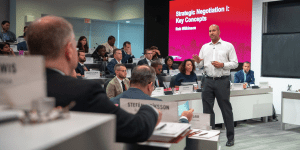Enhancing your effectiveness as a negotiator

When leaders at all levels hear the word “negotiation” it often brings to mind tense talks with high stakes: tough-talks haggling over the budget, hammering out a key union contract, enticing an employer to invest or expand in your city—or even just the dreaded salary negotiation.
But negotiation is just as much about handling everyday interactions with colleagues and partners as it is about sealing big deals in the spotlight. Anytime you need to work with other people to get something done, you’re negotiating. In an urban context, where problems are almost always complex and often require collaboration across departments, jurisdictions, and sectors, the reality is that mayors and their top lieutenants—whether they realize it or not—are negotiating pretty much all the time.
This can be a challenge. On one hand, it means local leaders need to be sharp negotiators in order to deliver the best possible results for residents. On the other hand, the mere thought of negotiating makes many people anxious and uneasy. The good news, as I discuss regularly with mayors and senior city leaders in executive training sessions through the Bloomberg Harvard City Leadership Initiative, it’s a skill they can study, practice, and ultimately get better at.
Here are four things I’ve learned from working with leaders from across a number of industries that city leaders should keep in mind in their own negotiations.
Negotiation is not a zero-sum game. People often go into a negotiation thinking it’s an adversarial battle, where the goal is to “win”—and for the party across the table to lose. That approach can be risky.
Instead, adjust your mindset. Think of negotiation as a joint exercise in creative problem solving, where the goal is not only to get a desirable outcome for both sides but a better outcome than either of you could achieve on your own. There’s a saying that many people find useful in negotiation: Help the other side write their victory speech. When the goal is for both sides to “win,” the process usually goes smoother and you build a better relationship for the long run.
Ask questions. Most mayors and senior city leaders are really good listeners—they do it all the time with their constituents. But put them in a negotiation, as we do in classroom exercises in the Bloomberg Harvard program, and something shifts. They quickly flip into advocacy mode, telling the other side what they think the right answer is. It’s only natural: When we’re good at something and know our stuff, we usually want to show it.
The problem is, advocacy is often the least influential path to persuasion. The research on this is overwhelmingly clear. Instead, start a negotiation by trying to understand the other party’s perspective first. Ask lots of questions—and listen to the answers. Be curious. The person or people you are negotiating with will be more open to hearing what’s driving you if you authentically care about what’s driving them.
[Read: ‘Teaming’ in and out of City Hall]
Tune into your emotions—and theirs. People often think of negotiation as a purely logical and rational exercise. It isn’t. As my Harvard colleagues Roger Fisher and Daniel Shapiro showed in their book, “Beyond Reason,” our brains are hijacked by emotions all the time. We’re wired that way to survive. Why would we act any differently in a negotiation?
The first step in engaging and managing our emotions is to recognize that we all have them.
As Fisher and Shapiro wrote, there are five core emotional interests people need fulfilled in their work. Appreciation is the desire to feel valued. Affiliation is the drive to feel connected and part of the group. Autonomy is the freedom to decide for ourselves. Role is the need to have a satisfying position. And status is the desire to be given the respect and recognition we think is appropriate and deserved. The best way to get someone else to focus on these interests in you is to pay attention to these interests in them.
Another key consideration is fairness. When humans feel they are being treated unfairly, it tends to trigger strong emotional reactions. Unfortunately, there’s no easy rule to follow: Standards of fairness vary from person to person. The critical point is don’t overlook how the feeling of being treated unfairly can impact either side of a negotiation. When we receive an offer we perceive as unfair, it hurts. The same is true when we make an offer we think is fair and it’s rejected.
Use your time wisely. Often in negotiations, people want to dive straight into the substance. They know what they want, and can’t wait to begin marshalling data, citing research, and building the case to win the argument. Before you get to any of that, however, it pays to slow down and discuss with your negotiating partner a few things about process. How are we going to spend our time together? What are we hoping to get out of it? How are we going to break up the issues at hand? Share information? Learn? Brainstorm?
One of the most famous examples is the process U.S. Senator George Mitchell used to negotiate the Good Friday Agreement for Northern Ireland. Before plunging into the heart of the ancient political and religious disputes, he spent eight months working out ground rules for a peaceful negotiation that came to be known as the “Mitchell Principles.” Doing that first got all the stakeholders into a mode of inquiry, listening, and joint problem solving, rather than airing old grievances.
[Read: Meet this year’s class of Bloomberg Harvard mayors]
Another excellent example is one Mike Bloomberg tells about his first 100 days as Mayor of New York City. “The press wanted to write the ‘100-day story,” Mayor Bloomberg said. “They asked; ‘What did you do in the first 100 days? And I said, ‘I built my team.’ And they responded, ‘Yes, but what legislation did you pass? What did you accomplish?’ And I said, ‘I built my team.’”
Process and preparation matter, sometimes even more than substance. When it comes to negotiation, sometimes you have to slow down to move fast.
Robert Wilkinson teaches courses on negotiation and leadership, and is on the faculty at the Kennedy School of Government at Harvard University. Rob successfully supports numerous Fortune 500 companies, major government agencies, international organizations, and charities, helping them to build their negotiation, leadership and team management skills, and to increase their overall effectiveness. He has more than 25 years of experience, in over 50 countries, across the public, private and not-profit sectors.

